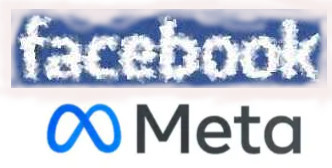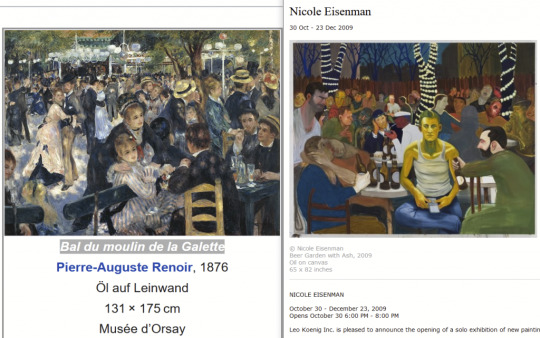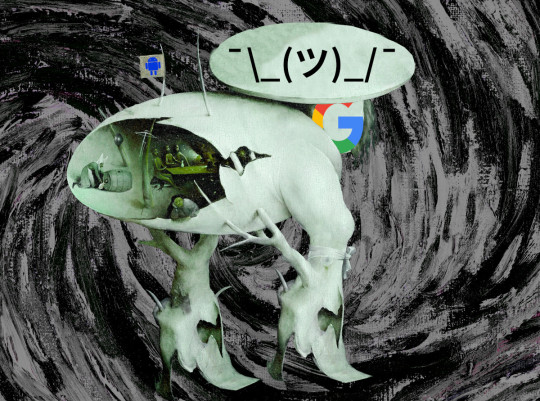#monopol
Text

Melitta Baumeister
9 notes
·
View notes
Text

ARTMIXER
{ART} zine | {MONOPOL} zine
2 notes
·
View notes
Text
Illusion of Choice und die Macht der Konzerne
Weisst du um die Macht der globalen Konzerne? Wenn nicht, dann gibt es heute einen kurzen Exkurs. Es geht dabei um die “Illusion of Choice“. Wie der Name bereits sagt, handelt es sich um die “Illusion der Wahl”. Gemeint sind multinationale Konzerne, die eine Vielzahl an Marken besitzen, diese aber unter je eigenem Namen herausgeben. Besonders ausgeprägt ist diese “Illusion of Choice” im…

View On WordPress
0 notes
Text

Monopole lachen über DSGVO
Wer übertrifft wen?
Meta verletzt diverse Prinzipien der Datenschutzgrundverordnung.
Apple hat seine Marktmacht missbraucht und gegen EU-Kartellrecht verstoßen.
Zwei Feststellungen zu zwei der fünf Big5 (GAFAM = Google, Amazon, Facebook, Apple, Microsoft) über die wir leider schon viel zu oft schreiben mussten. Seit über 10 Jahren schraubt sich dieser Kampf in Form von Bußgeldern in immer wahnsinnige Höhen. Apple hat seine Konkurrenz bei Musikstreaming-Apps jahrelang benachteiligt und soll nun 1,8 Milliarden Euro Geldbuße zahlen, sagt die EU Kommission.
Bis zu einer wirklichen Zahlung wird sicher noch einige Zeit vergehen und dann sind das bei einem Jahresumsatz von über 500 Milliarden $ und einem Gewinn von 33 Milliarden $ die berühmten Peanuts, wie es der damalige Deutsche Bank Chef in einer ähnlichen Situation mal nannte. Unternehmen deren finanzielle Macht die von Staaten weit übersteigt, sind mit Bußgeldern nicht klein zu kriegen. Trotzdem freuen wir uns darüber.
Was waren die Vergehen?
Spotify hatte gegen Apple geklagt, weil der Apple App Store exklusiv ist, um überhaupt Apps auf Apple Geräten zu installieren. Apple knüpft den kostenpflichtigen und exklusiven Zugang an bestimmte Bedingungen. App-Entwickler:innen dürfen ihre Nutzer:innen z.B. in einer App nicht über günstigere Musikabonnements informieren, die sich außerhalb der App beziehen lassen. Diese Beschneidung der Informationsfreiheit wird von Apple mit unternehmerischer Freiheit und dem Wettbewerbsrecht begründet.
Doch genau gegen das Wettbewerbsrecht verstößt diese Regel und das ist nicht neu, sondern seit mehr als 10 Jahren geübte Praxis. Die EU-Kommission nennt solche Praktiken vorsichtig "weder notwendig noch angemessen" und sie würden "unlautere Handelsbedingungen" darstellen.
Meta nicht besser
Europäische Verbraucherorganisationen haben bei Datenschutzbehörden Beschwerde eingelegt, weil Meta von den Nutzer:innen der Plattformen Facebook und Instagram in der EU verlangt, entweder der Verarbeitung ihrer Daten zu Werbezwecken zuzustimmen oder zu zahlen, um keine Werbung angezeigt zu bekommen, schreibt Netzpolitik.org.
Von den 8 Mitglieder der Europäischen Verbraucherorganisation (BEUC) wird kritisieren, dass Meta sein Vorgehen in irreführende Informationen versteckt, und dass die hohen Gebühren von 12,99 Euro pro Monat zur Werbefreiheit in keinem Verhältnis stehen. Meta nutzt dabei seine Marktmacht, praktisch ein Monopol bei WhatsApp, aus, weil die Menschen ihre "Freunde" mit hoher Wahrscheinlichkeit nur dort vorfinden.
Auch verhängte Bußgelder gegen Meta, z.B. hatte die irische Datenschutzbehörde DPC eine 1,2 Milliarden Euro Strafe wegen der Übermittlung von Facebook-Daten aus der EU und dem Europäischen Wirtschaftsraum an die USA verhängt, wurden bisher nicht gezahlt. Eine Berufung dagegen durch Facebook wurde im Juli 2023 durch den Europäische Gerichtshof (EuGH) mit einem Urteil zurückgewiesen.
Auch in diesen Fällen gilt die Feststellung, dass Meta mit 135 Milliarden $ Umsatz und 56 Milliarden $ Gewinn im letzten Jahr dies gut verschmerzen könnte, aber mit dem Geld auch teure Anwälte bezahlen kann, die die EU am Nasenring vorführen können.
Diese Konzerne gehören zerschlagen! Selbst die FTC, die vor Jahrzehnten noch bereit waren At&T zu zerschlagen, trauen sich an solche Riesen heute nicht mehr ...
Mehr dazu bei https://netzpolitik.org/2024/meta-europaeische-verbraucherverbaende-gehen-gegen-illegale-datenverarbeitung-vor/
und https://netzpolitik.org/2024/marktmacht-missbraucht-apple-handelt-sich-milliardenbusse-ein/
Kategorie[21]: Unsere Themen in der Presse Short-Link dieser Seite: a-fsa.de/d/3zn
Link zu dieser Seite: https://www.aktion-freiheitstattangst.org/de/articles/8705-20240306-monopole-lachen-ueber-dsgvo.html
#Big5#GAFAM#Google#Amazon#Facebook#Apple#Microsoft#Meta#Transparenz#Informationsfreiheit#EU#Klage#Bußgelder#Spotify#AppStore#Zwang#Konkurrenz#Monopol#WhatsApp
1 note
·
View note
Text
Lu // Beer Garden with AK (von 2009) // Nicole Eisenman

Warten am Bahnhof. Köln oder Düsseldorf? Vielleicht auch Unna. Diesmal war es die neueste Ausgabe von Monopol. Warum Monopol? Titel! Titelseiten funktionieren immer noch, auch im Zeitalter des Internets. Es zeigt eine Person in einem Taucheranzug mit Taucherbrille. Kann auch nur eine sehr sehr coole Designerbrille mit Gesicht dahinter sein. Auf jeden Fall hat mich der Titel angesprochen. Monopol selbst habe ich noch nie gekauft und die Künstlerinndes Tauchermenschen kannte ich auch nicht. Nie von Nicole Eisenman gehört.

https://www.monopol-magazin.de/warum-nicole-eisenman-die-coolste-malerin-der-gegenwart-ist
Nicole Eisenman soll ein Talent für provokante Kunstwerke haben, in denen Frauen sich gegenseitig lieben und Amazonen die Massenkastration feiern. Das ist nicht jedermanns Sache, aber ich bin mir sicher, dass es dafür einen Markt gibt!
Bei Wikipedia schnell noch die Basics zur Künstlerin geklärt: Eisenman wurde in Verdun, Frankreich geboren, weil ihr Vater dort stationiert war. Sie wuchs in New York auf und studierte Malerei in Providence. In ihrer neorealistischen Malerei formt Eisenman spielerisch aus verschiedenen Stil- und Kompositionselementen der Kunstgeschichte - von der Renaissance über die Historienmalerei bis zur Moderne - neue, zeitgenössische Aussagen. Dabei knüpft sie an ihren italienischen Malerkollegen Renato Guttuso (1912-1986) an. In ihre Kompositionen integriert sie Elemente der Medienkultur wie Comic-Zeichnungen, Pornografie, TV-Alltag und Werbung und eignet sich unterschiedliche Malstile an - etwa die pseudo-naiven Darstellungen eines Henri Rousseau, die Schreckensmotive Goyas oder die Gesellschaftskarikaturen von Georg Grosz und James Ensor - und zeigt so eine Vielfalt an Perspektiven auf.
Beer Garden with AK
(2009)
Leute, schaut euch dieses Kunstwerk von Nicole Eisenman an! „Beer Garden with AK“ ist ein echter Hingucker! Es zeigt eine Szene in einem Biergarten mit all diesen verrückten Figuren und Charakteren, die umeinander herumstehen und ihre eigenen Geschichten erzählen.

https://de.wikipedia.org/wiki/Bal_du_moulin_de_la_Galette
https://artmap.com/koenigandclinton/exhibition/nicole-eisenman-2009
Da ist dieser Typ im Unterhemd, der sein in die Jahre gekommenes Handy lustlos in den Schoß fallen lässt und völlig unmotiviert und gedankenverloren links und rechts gleichzeitig am Betrachter vorbeischaut. Sitzt da rum, ganz in seiner James-Dean-Welt versunken, mit seinen muskulösen Schultern. Stundenlang schweben er und sein Kommilitone im grünen Ganzkörperanzug schweigend durch den Sommerabend.
Noch am selben Tisch finden wir die Romantiker. Zwei sich liebende, ineinanderfließende Körper, bierdurchtränkt und zutiefst glücklich. Ein klassisches Räubergesicht direkt darüber gemalt, immer bereit, das nächste besoffenen Hipster-Portemonnaie zu fingern. Matrose und Kapitän Limonadenschlürfend unter kringelig beleuchteten Baumstämmen.
Ein Durcheinander wie beim „Bal du moulin de la Galette“. Das Ganze hat etwas Ausgelassenes, ist nicht schräg, nicht besonders cool, könnte irgendwo im Foyer eines Multiplex-Kinos hängen. Wartende Kinobesucher würden im Wimmelbild nach bekannten Gesichtern suchen, mehr nicht. Kein Geniestreich. Aber schön, dass es das Bild gibt und noch schöner, dass ich es sehen durfte. Danke Nicole.
Dein Lu
Read the full article
0 notes
Text

enterprise diplomacy event
#jim is also there somewhere doing captain things so they can’t monopolize his time rn unfortunately#star trek#star trek tos#star trek tos fanart#star trek fanart#leonard mccoy#leonard bones mccoy#doctor mccoy#spock#mr spock#spock: if i recall correctly you are not even required to be here?#bones: if i’m not here someones liable to get poisoned or assassinated and it ll probably be you or jim. so#also he just gets bored
2K notes
·
View notes
Text
ŁGARZE MONOPOLI PALIW KOPALNYCH
ŁGARZE MONOPOLI PALIW KOPALNYCH
Jak tak można ludzi bałamucić?!
Pcimianina ściemy czas ukrócić!
Nie godzi się i na kpinę zakrawa
Cała ta z paliwem farsa i zabawa.
Łgarze monopolu paliw kopalnych
Winni są stokroć przewin karalnych
Łupienia narodu w imię Prezesa
Wcielenia kaczego samego biesa.
Rozliczy złodziei was rzecz pospolita.
Pójdziecie siedzieć! Wtedy będziem kwita.
Do tego czasu macie czas na skruchę
I do płaczu ze wstydu kamienną poduchę.
copyright @rymonauta
#poezja#wiersz#ściema#polityka#podatki#monopol#paliwa#władza#bezkarność#protest#oburzenie#gniew#prezes#pcim
1 note
·
View note
Photo

Stanislav Novotný se ptá Aleny Dernerové na nelegální vývozy léků do zahraničí, proč v lékárnách chybí základní léky pro dětské pacienty a nečinnost ministra Válka https://ocemsemlci.cz/o-cem-se-mlci-alena-dernerova-2/?feed_id=1102
#AlenaDernerová#antibiotika#farmakologickéfirmy#lékárny#léky#Ministerstvozdravotnictví#monopol#nelegálnívývozy#Nurofen#OphthalmoSeptonex#Otobacid#Paxlovid#StanislavNovotný#Státníústavprokontroluléčiv#SÚKL
1 note
·
View note
Text
Too big to care

I'm on tour with my new, nationally bestselling novel The Bezzle! Catch me in BOSTON with Randall "XKCD" Munroe (Apr 11), then PROVIDENCE (Apr 12), and beyond!

Remember the first time you used Google search? It was like magic. After years of progressively worsening search quality from Altavista and Yahoo, Google was literally stunning, a gateway to the very best things on the internet.
Today, Google has a 90% search market-share. They got it the hard way: they cheated. Google spends tens of billions of dollars on payola in order to ensure that they are the default search engine behind every search box you encounter on every device, every service and every website:
https://pluralistic.net/2023/10/03/not-feeling-lucky/#fundamental-laws-of-economics
Not coincidentally, Google's search is getting progressively, monotonically worse. It is a cesspool of botshit, spam, scams, and nonsense. Important resources that I never bothered to bookmark because I could find them with a quick Google search no longer show up in the first ten screens of results:
https://pluralistic.net/2024/02/21/im-feeling-unlucky/#not-up-to-the-task
Even after all that payola, Google is still absurdly profitable. They have so much money, they were able to do a $80 billion stock buyback. Just a few months later, Google fired 12,000 skilled technical workers. Essentially, Google is saying that they don't need to spend money on quality, because we're all locked into using Google search. It's cheaper to buy the default search box everywhere in the world than it is to make a product that is so good that even if we tried another search engine, we'd still prefer Google.
This is enshittification. Google is shifting value away from end users (searchers) and business customers (advertisers, publishers and merchants) to itself:
https://pluralistic.net/2024/03/05/the-map-is-not-the-territory/#apor-locksmith
And here's the thing: there are search engines out there that are so good that if you just try them, you'll get that same feeling you got the first time you tried Google.
When I was in Tucson last month on my book-tour for my new novel The Bezzle, I crashed with my pals Patrick and Teresa Nielsen Hayden. I've know them since I was a teenager (Patrick is my editor).
We were sitting in his living room on our laptops – just like old times! – and Patrick asked me if I'd tried Kagi, a new search-engine.
Teresa chimed in, extolling the advanced search features, the "lenses" that surfaced specific kinds of resources on the web.
I hadn't even heard of Kagi, but the Nielsen Haydens are among the most effective researchers I know – both in their professional editorial lives and in their many obsessive hobbies. If it was good enough for them…
I tried it. It was magic.
No, seriously. All those things Google couldn't find anymore? Top of the search pile. Queries that generated pages of spam in Google results? Fucking pristine on Kagi – the right answers, over and over again.
That was before I started playing with Kagi's lenses and other bells and whistles, which elevated the search experience from "magic" to sorcerous.
The catch is that Kagi costs money – after 100 queries, they want you to cough up $10/month ($14 for a couple or $20 for a family with up to six accounts, and some kid-specific features):
https://kagi.com/settings?p=billing_plan&plan=family
I immediately bought a family plan. I've been using it for a month. I've basically stopped using Google search altogether.
Kagi just let me get a lot more done, and I assumed that they were some kind of wildly capitalized startup that was running their own crawl and and their own data-centers. But this morning, I read Jason Koebler's 404 Media report on his own experiences using it:
https://www.404media.co/friendship-ended-with-google-now-kagi-is-my-best-friend/
Koebler's piece contained a key detail that I'd somehow missed:
When you search on Kagi, the service makes a series of “anonymized API calls to traditional search indexes like Google, Yandex, Mojeek, and Brave,” as well as a handful of other specialized search engines, Wikimedia Commons, Flickr, etc. Kagi then combines this with its own web index and news index (for news searches) to build the results pages that you see. So, essentially, you are getting some mix of Google search results combined with results from other indexes.
In other words: Kagi is a heavily customized, anonymized front-end to Google.
The implications of this are stunning. It means that Google's enshittified search-results are a choice. Those ad-strewn, sub-Altavista, spam-drowned search pages are a feature, not a bug. Google prefers those results to Kagi, because Google makes more money out of shit than they would out of delivering a good product:
https://www.theverge.com/2024/4/2/24117976/best-printer-2024-home-use-office-use-labels-school-homework
No wonder Google spends a whole-ass Twitter every year to make sure you never try a rival search engine. Bottom line: they ran the numbers and figured out their most profitable course of action is to enshittify their flagship product and bribe their "competitors" like Apple and Samsung so that you never try another search engine and have another one of those magic moments that sent all those Jeeves-askin' Yahooers to Google a quarter-century ago.
One of my favorite TV comedy bits is Lily Tomlin as Ernestine the AT&T operator; Tomlin would do these pitches for the Bell System and end every ad with "We don't care. We don't have to. We're the phone company":
https://snltranscripts.jt.org/76/76aphonecompany.phtml
Speaking of TV comedy: this week saw FTC chair Lina Khan appear on The Daily Show with Jon Stewart. It was amazing:
https://www.youtube.com/watch?v=oaDTiWaYfcM
The coverage of Khan's appearance has focused on Stewart's revelation that when he was doing a show on Apple TV, the company prohibited him from interviewing her (presumably because of her hostility to tech monopolies):
https://www.thebignewsletter.com/p/apple-got-caught-censoring-its-own
But for me, the big moment came when Khan described tech monopolists as "too big to care."
What a phrase!
Since the subprime crisis, we're all familiar with businesses being "too big to fail" and "too big to jail." But "too big to care?" Oof, that got me right in the feels.
Because that's what it feels like to use enshittified Google. That's what it feels like to discover that Kagi – the good search engine – is mostly Google with the weights adjusted to serve users, not shareholders.
Google used to care. They cared because they were worried about competitors and regulators. They cared because their workers made them care:
https://www.vox.com/future-perfect/2019/4/4/18295933/google-cancels-ai-ethics-board
Google doesn't care anymore. They don't have to. They're the search company.

If you'd like an essay-formatted version of this post to read or share, here's a link to it on pluralistic.net, my surveillance-free, ad-free, tracker-free blog:
https://pluralistic.net/2024/04/04/teach-me-how-to-shruggie/#kagi
#pluralistic#john stewart#the daily show#apple#monopoly#lina khan#ftc#too big to fail#too big to jail#monopolism#trustbusting#antitrust#search#enshittification#kagi#google
438 notes
·
View notes
Text

she's horsin' around

#sorry for monopolizing the arknights tag#me: gets free from artblock#the arknights tag: HERE IT COMES#arknights#grani#stalkiwiart
435 notes
·
View notes
Photo



Wroclaw, Poland - hotel Monopol at night.
#Monopol#hotel#night#noc#Poland#Polska#Polonia#Polen#street#ulica#Wroclaw#Wrocław#building#budynek#Polonaise#Pologne
0 notes
Text
crying over the fact that from my current husband rotation (scara, gojo, chrollo, and blade), blade of all people is the healthiest person to be in a romantic relationship with 😭
#scara is well. Scaramouche.#gojo is the type to monopolize your attention and be kinda creepy at times#even in a non yandere scenario chrollo's still lying to you/doing a lil emotional manipulation as a treat#then there's blade.#is he an intergalactically wanted criminal who has slaughtered masses? Perhaps#however#he's very up front with you about everything and the most likely to respect a breakup request unlike the other three wackos#(he'd brood for a long time but at least he isn't gaslight gatekeep girlbossing you from ending the relationship)#lock.txt
269 notes
·
View notes
Text
I have a lot of complicated feelings when it comes to what Neflix has done with the Witcher, but my probably least favourite is the line of argumentation that originated during shitstorms related to the first and second season that I was unlucky to witness.
It boils down to "Netflix's reinterpretation and vision is valid, because the Witcher books are not written to be slavic. The overwhelming Slavic aestetic is CDPR's interpretation, and the setting in the original books is universally European, as there are references to Arthurian mythos and celtic languages"
And I'm not sure where this argument originated and whether it's parroting Sapkowski's own words or a common stance of people who haven't considered the underlying themes of the books series.
Because while it's true that there are a lot of western european influences in the Witcher, it's still Central/Eastern European to the bone, and at its core, the lack of understanding of this topic is what makes the Netflix series inauthentic in my eyes.
The slavicness of the Witcher goes deeper than the aestetics, mannerisms, vodka and sour cucumbers. Deeper than Zoltan wrapping his sword with leopard pelt, like he was a hussar. Deeper than the Redanian queen Hedvig and her white eagle on the red field.
What Witcher is actually about? It's a story about destiny, sure. It's a sword-and-sorcery style, antiheroic deconstruction of a fairy tale, too, and it's a weird mix of many culture's influences.
But it's also a story about mundane evil and mundane good. If You think about most dark, gritty problems the world of Witcher faces, it's xenophobia and discrimination, insularism and superstition. Deep-seated fear of the unknown, the powerlessness of common people in the face of danger, war, poverty and hunger. It's what makes people spit over their left shoulder when they see a witcher, it's what makes them distrust their neighbor, clinging to anything they deem safe and known. It's their misfortune and pent-up anger that make them seek scapegoats and be mindlessly, mundanely cruel to the ones weaker than themselves.
There are of course evil wizards, complicated conspiracies and crowned heads, yes. But much of the destruction and depravity is rooted in everyday mundane cycle of violence and misery. The worst monsters in the series are not those killed with a silver sword, but with steel.
it's hard to explain but it's the same sort of motiveless, mundane evil that still persist in our poorer regions, born out of generations-long poverty and misery. The behaviour of peasants in Witcher, and the distrust towards authority including kings and monarchs didn't come from nowhere.
On the other hand, among those same, desperately poor people, there is always someone who will share their meal with a traveller, who will risk their safety pulling a wounded stranger off the road into safety. Inconditional kindness among inconditional hate. Most of Geralt's friends try to be decent people in the horrible world. This sort of contrasting mentalities in the recently war-ridden world is intimately familiar to Eastern and Cetral Europe.
But it doesn't end here. Nilfgaard is also a uniquely Central/Eastern European threat. It's a combination of the Third Reich in its aestetics and its sense of superiority and the Stalinist USSR with its personality cult, vast territory and huge army, and as such it's instantly recognisable by anybody whose country was unlucky enough to be caught in-between those two forces. Nilfgaard implements total war and looks upon the northerners with contempt, conscripts the conquered people forcibly, denying them the right of their own identity. It may seem familiar and relevant to many opressed people, but it's in its essence the processing of the trauma of the WW2 and subsequent occupation.
My favourite case are the nonhumans, because their treatment is in a sense a reminder of our worst traits and the worst sins in our history - the regional antisemitism and/or xenophobia, violence, local pogroms. But at the very same time, the dilemma of Scoia'Tael, their impossible choice between maintaining their identity, a small semblance of freedom and their survival, them hiding in the forests, even the fact that they are generally deemed bandits, it all touches the very traumatic parts of specifically Polish history, such as January Uprising, Warsaw Uprising, Ghetto Uprising, the underground resistance in WW2 and the subsequent complicated problem of the Cursed Soldiers all at once. They are the 'other' to the general population, but their underlying struggle is also intimately known to us.
The slavic monsters are an aestetic choice, yes, but I think they are also a reflection of our local, private sins. These are our own, insular boogeymen, fears made flesh. They reproduce due to horrors of the war or they are an unprovoked misfortune that descends from nowhere and whose appearance amplifies the local injustices.
I'm not talking about many, many tiny references that exist in the books, these are just the most blatant examples that come to mind. Anyway, the thing is, whether Sapkowski has intended it or not, Witcher is slavic and it's Polish because it contains social commentary. Many aspects of its worldbuilding reflect our traumas and our national sins. It's not exclusively Polish in its influences and philosophical motifs of course, but it's obvious it doesn't exist in a vacuum.
And it seems to me that the inherently Eastern European aspects of Witcher are what was immediately rewritten in the series. It seems to me that the subtler underlying conflicts were reshaped to be centered around servitude, class and gender disparity, and Nilfgaard is more of a fanatic terrorist state than an imposing, totalitarian empire. A lot of complexity seems to be abandoned in lieu of usual high-fantasy wordbuilding. It's especially weird to me because it was completely unnecessary. The Witcher books didn't need to be adjusted to speak about relevant problems - they already did it!
The problem of acceptance and discrimination is a very prevalent theme throughout the story! They are many strong female characters too, and they are well written. Honestly I don't know if I should find it insulting towards their viewers that they thought it won't be understood as it was and has to be somehow reshaped to fit the american perpective, because the current problems are very much discussed in there and Sapkowski is not subtle in showing that genocide and discrimination is evil. Heck, anyone who has read the ending knows how tragic it makes the whole story.
It also seems quite disrespectful, because they've basically taken a well-established piece of our domestic literature and popular culture and decided that the social commentary in it is not relevant. It is as if all it referenced was just not important enough and they decided to use it as an opportunity to talk about the problems they consider important.
And don't get me wrong, I'm not forcing anyone to write about Central European problems and traumas, I'm just confused that they've taken the piece of art already containing such a perspective on the popular and relevant problem and they just... disregarded it, because it wasn't their exact perspective on said problem.
And I think this homogenisation, maybe even from a certain point of view you could say it's worldview sanitisation is a problem, because it's really ironic, isn't it? To talk about inclusivity in a story which among other problems is about being different, and in the same time to get rid of motifs, themes and references because they are foreign? Because if something presents a different perspective it suddenly is less desirable?
There was a lot of talking about the showrunners travelling to Poland to understand the Witcher's slavic spirit and how to convey it. I don't think they really meant it beyond the most superficial, paper-thin facade.
#The witcher#Sorry if its convoluted I just got reminded of something and it made me a little angry#and as I had this conversation a lot of times I've decided to put it into written text#sorry about being bitter#but these are some of my favourite books and I'm still upset when I get reminded how badly they were treated in the recent adaptation#I'm not saying you should never change anything#But it's good to have enough background to understand why some things are the way they are in the original#and to understand what the source material is about#we don't talk about particular character's looks or something (altough I feel they could care more about it too)#but central themes tropes and motifs#long post#it may seem like I'm talking from a high horse here#people are welcome to interpret literature however they want#Nobody has a monopol on themes#I just think that in this particular case the cultural context influences the worldbuilding#and if changed it doesn't have the same impact anymore#meta
154 notes
·
View notes
Text

Wissenschaftler erklären Chat-Kontrolle für wirkungslos
Appell von Wissenschaftlern sollte gehört werden
Am 4. Juli 2023 haben Wissenschaftler:innen und Forschenden zur vorgeschlagenen EU-Verordnung zum sexuellen Missbrauch von Kindern eine Gemeinsame Erklärung an den Rat und das Parlament der EU verschickt. Darin führen sie erneut die Kritik auf, die bereits von vielen zivilen Organisationen gegen eine EU-Chatkontrolle genannt wurde.
Detailliert begründen sie warum diese Maßnahmen die Sicherheit im Internet schwächen und dem angeblichen Ziel nicht dienlich sein können. Sie kommen zu dem Schluss:
Wir warnen daher eindringlich davor, diese oder ähnliche Maßnahmen zu verfolgen. Ihr Erfolg angesichts der aktuell verfügbaren und absehbaren Technologie ist ausgeschlossen, und ihr Schadenspotenzial ist erheblich.
Als besonders gefährlich heben sie, wie netzpoltik.org in der Übersetzung des Offenen Briefes schreibt, folgende Punkte hervor:
Die gewählte Technologien zur Erkennung haben schwere Mängel und sind anfällig für Angriffe.
Die Auswirkungen einer Schwächung der Ende-zu-Ende-Verschlüsselung werden in vielen Bereichen, inbesondere bei Banken aber auch im normalen Internethandel und natürlich auch bei der privaten Kommunikation, unsere Nutzungsmöglichkeiten des Internets schwer beeinträchtigen.
Effektivität: Wir haben ernsthafte Bedenken, ob die von der Verordnung beschriebenen Technologien wirksam wären: Täter:innen wären sich ihrer bewusst und würden auf neue Techniken, Dienste und Plattformen ausweichen, um CSAM-Informationen auszutauschen und dabei der Entdeckung zu entgehen.
False Positives: Die vorgeschlagene Verordnung wird auch die Meinungsfreiheit von Kindern beeinträchtigen, da ihre Gespräche ebenfalls Alarme auslösen könnten.
Wenn es bei dem geplanten Vorhaben wirklich um den Schutz von Kindern gehen würde, müsste das Projekt nach dieser Analyse eingestellt werden.
Mehr dazu bei https://netzpolitik.org/2023/offener-brief-der-wissenschaft-das-client-side-scanning-ist-zum-scheitern-verurteilt/
Kategorie[21]: Unsere Themen in der Presse Short-Link dieser Seite: a-fsa.de/d/3v1
Link zu dieser Seite: https://www.aktion-freiheitstattangst.org/de/articles/8453-20230708-wissenschaftler-erklaeren-chat-kontrolle-fuer-wirkungslos.htm
#Chatkontrolle#OffenerBrief#Wissenschaftler#EU#Rat#Parlament#Ende-zu-Ende-Verschlüsselung#Effektivität#FalsePositives#Lauschangriff#Überwachung#Vorratsdatenspeicherung#Videoüberwachung#Rasterfahndung#Datenbanken#Verschlüsselung#Anonymisierung#Monopol#Meinungsfreiheit#Zensur
1 note
·
View note

